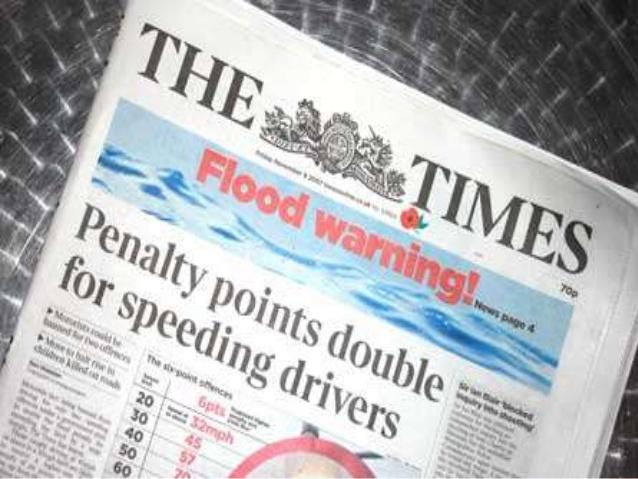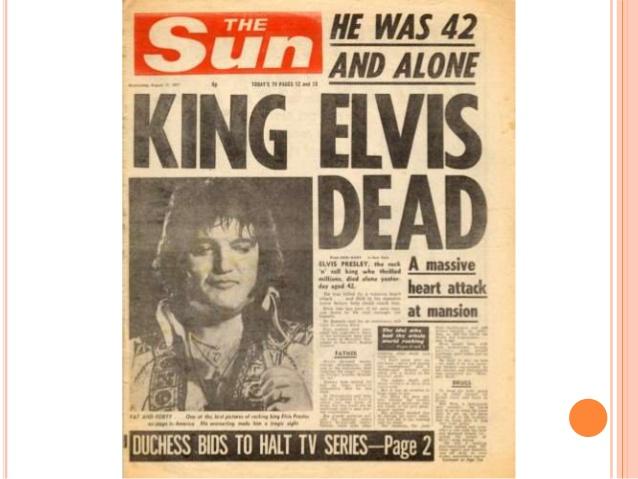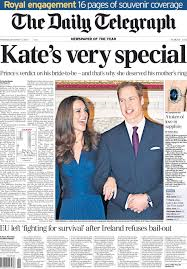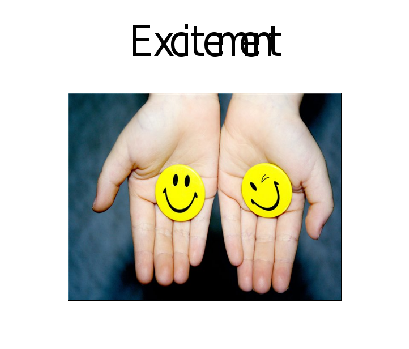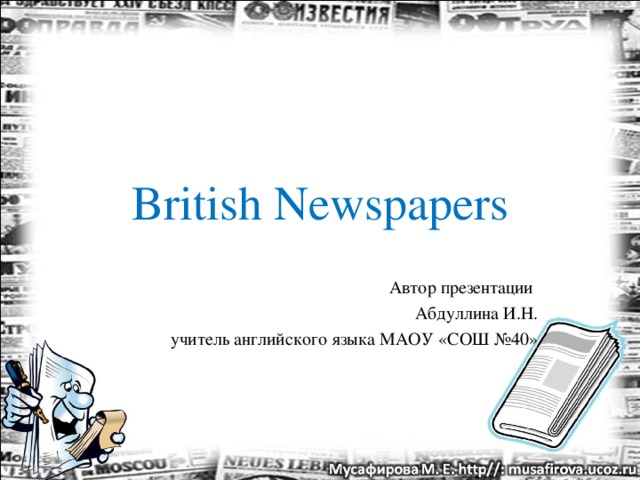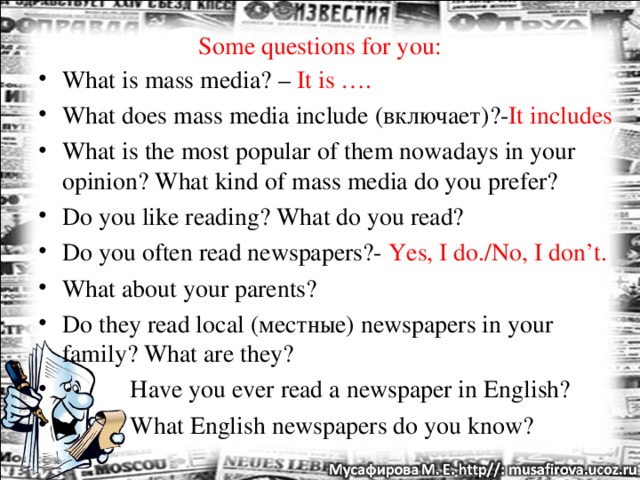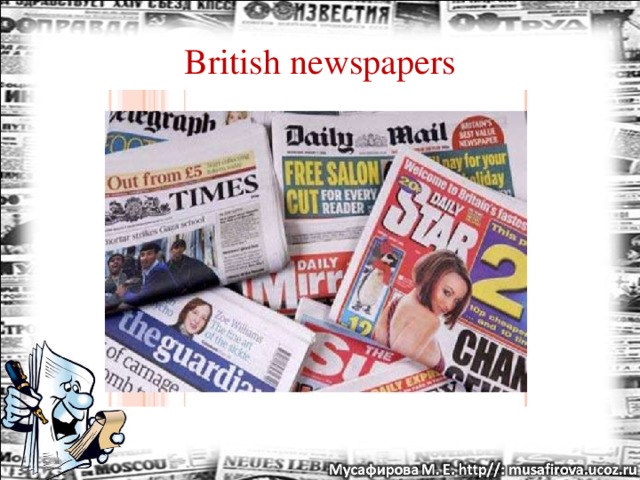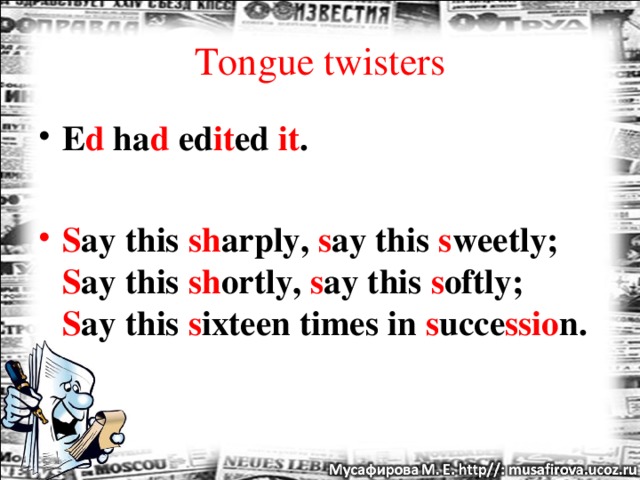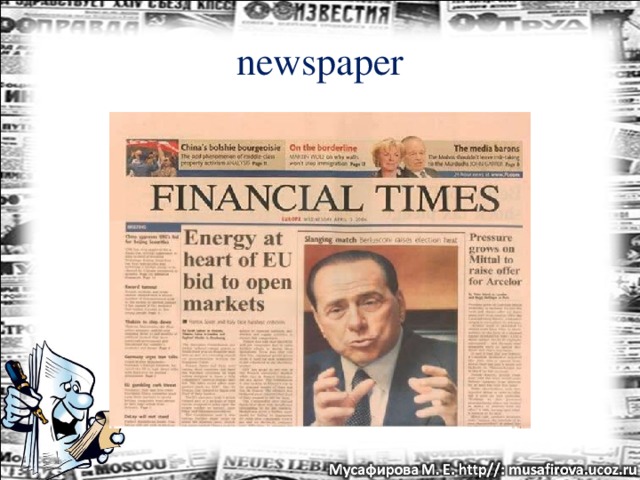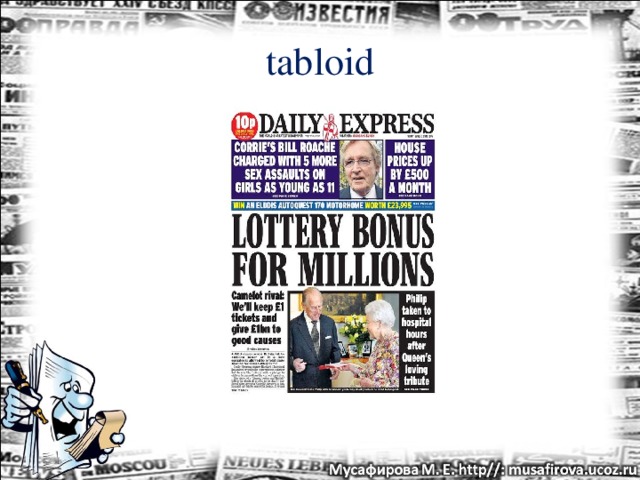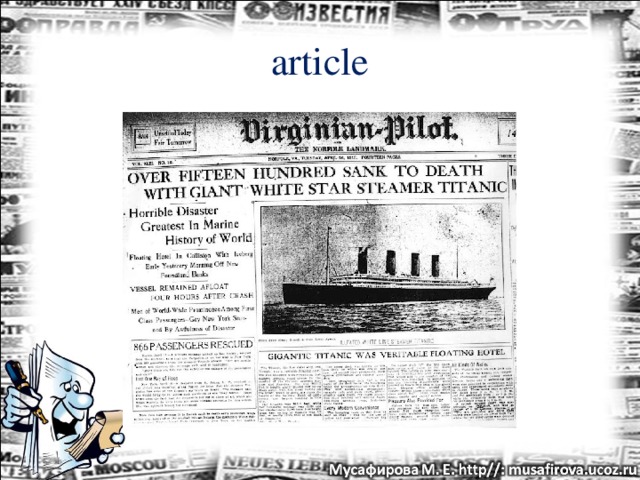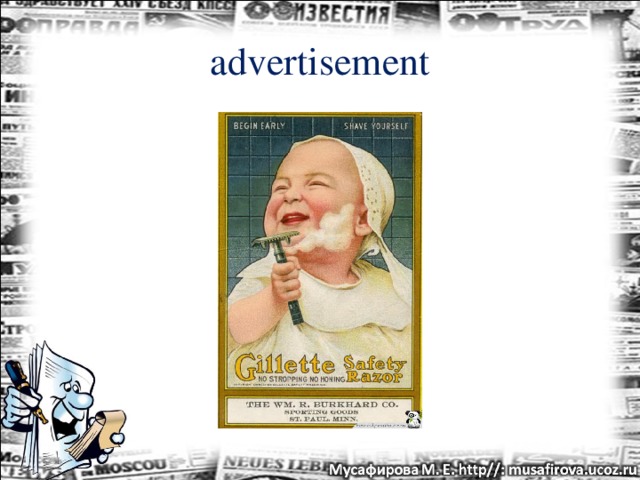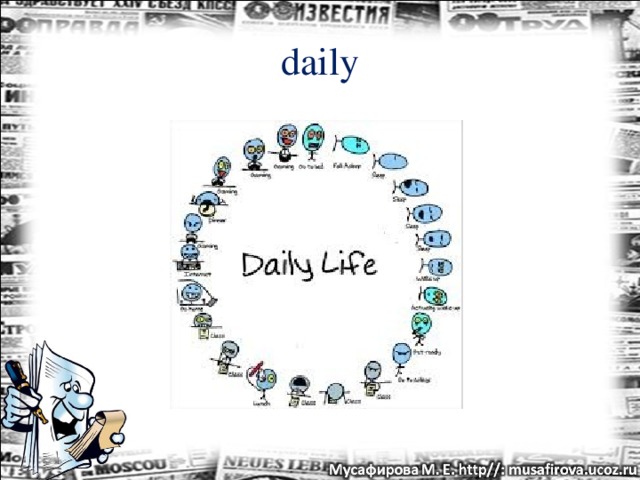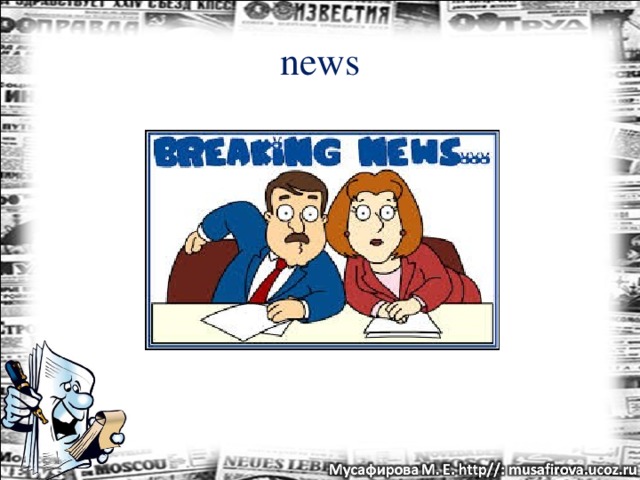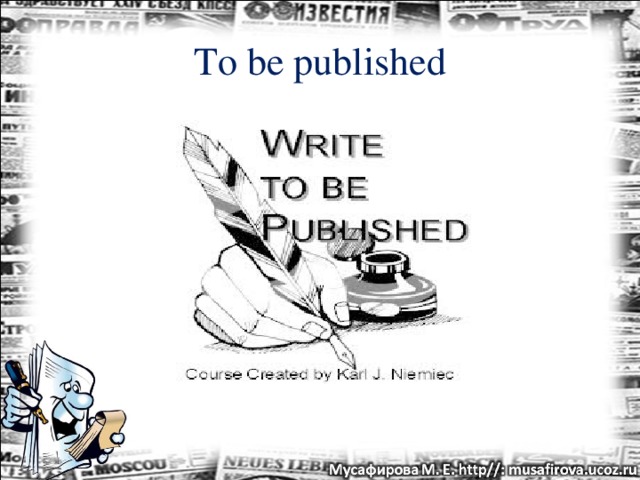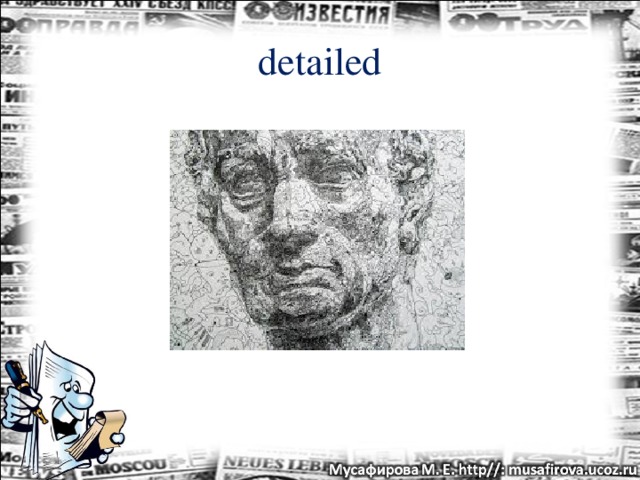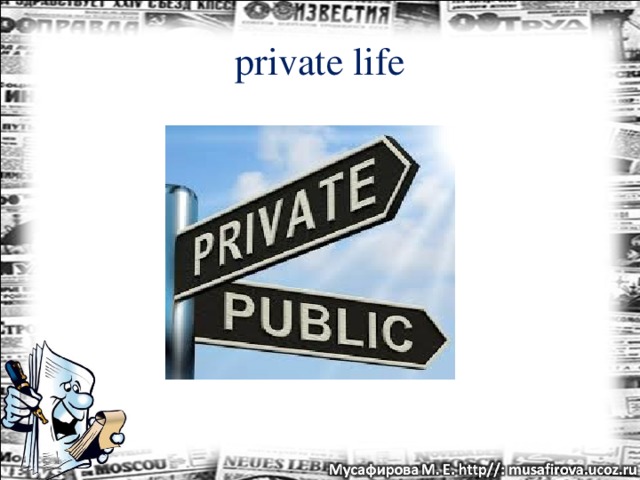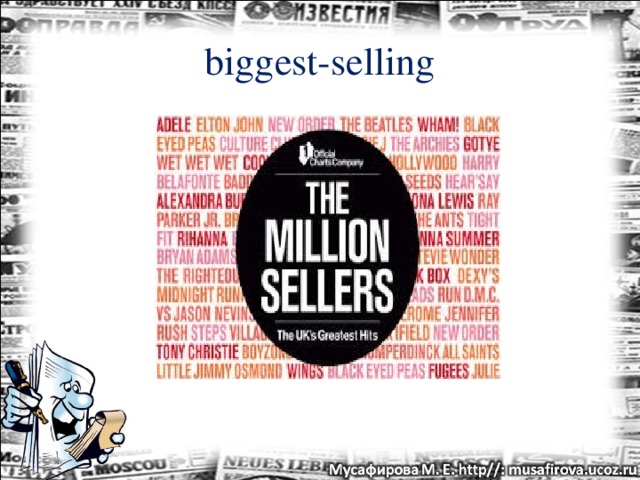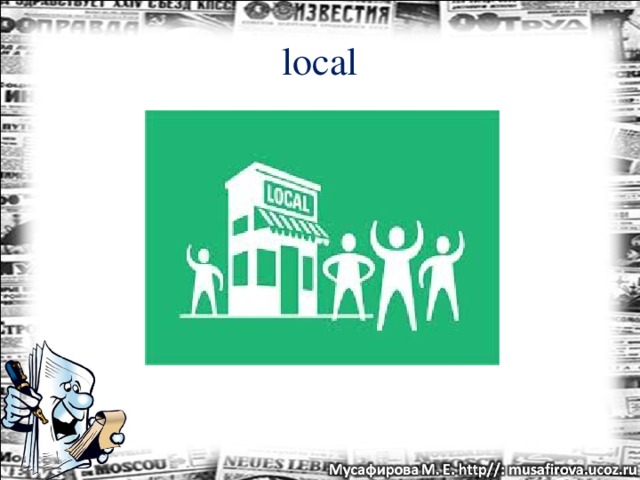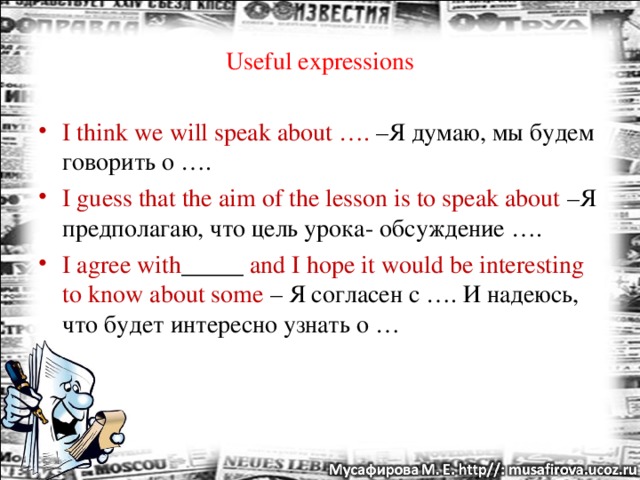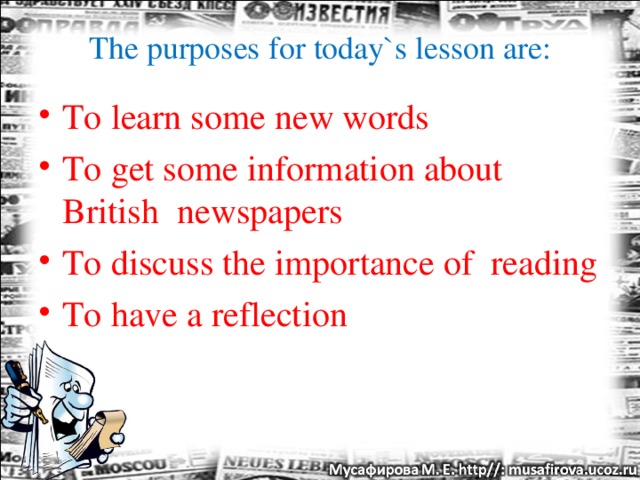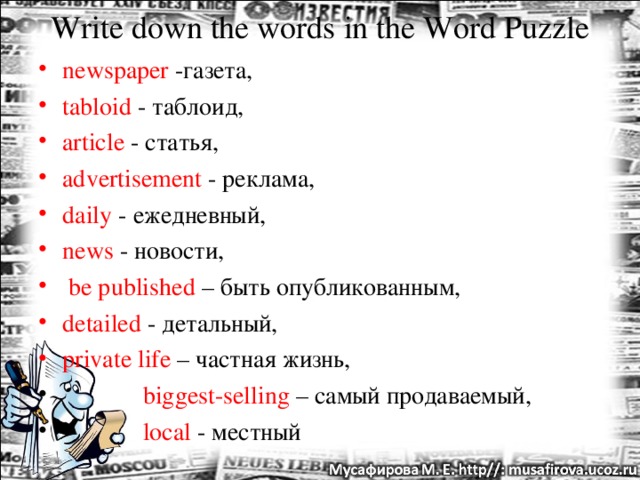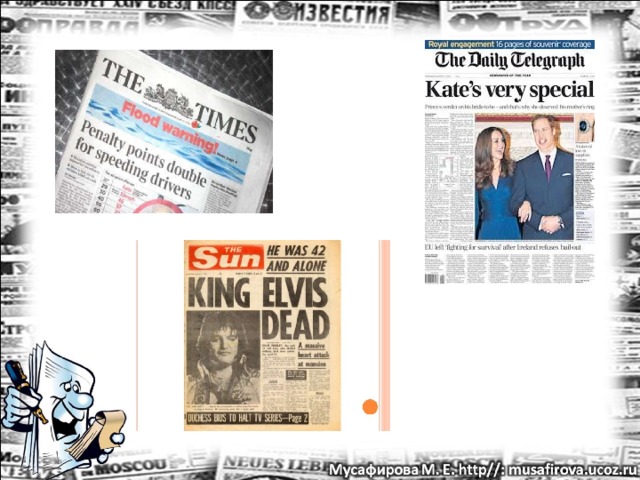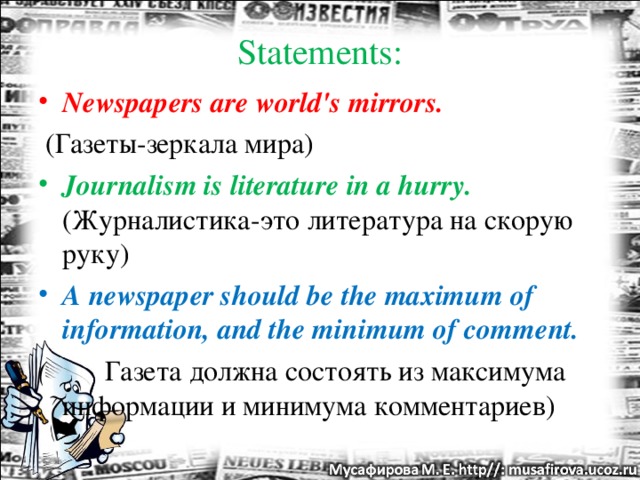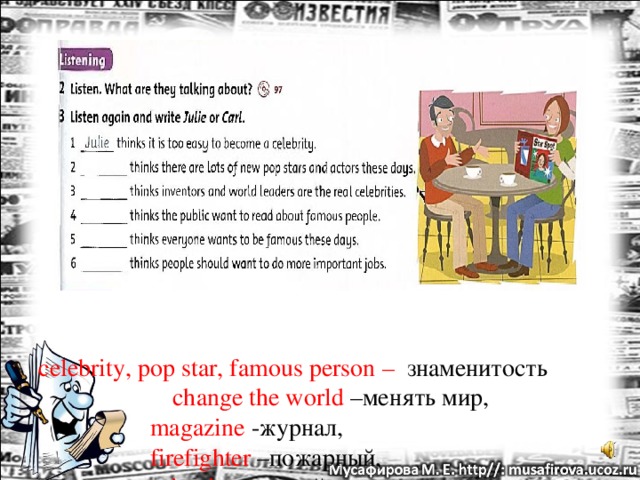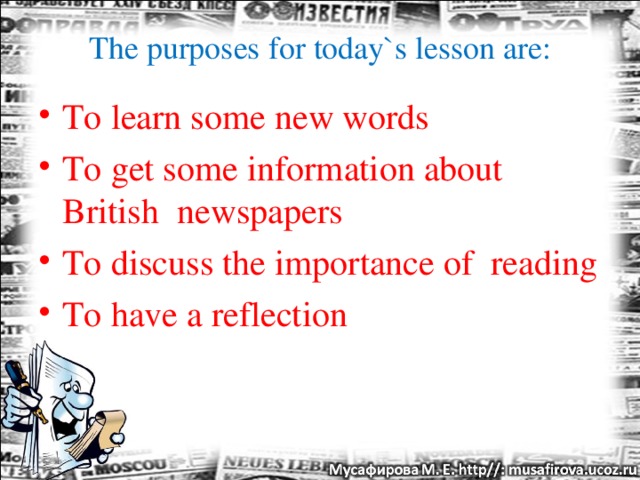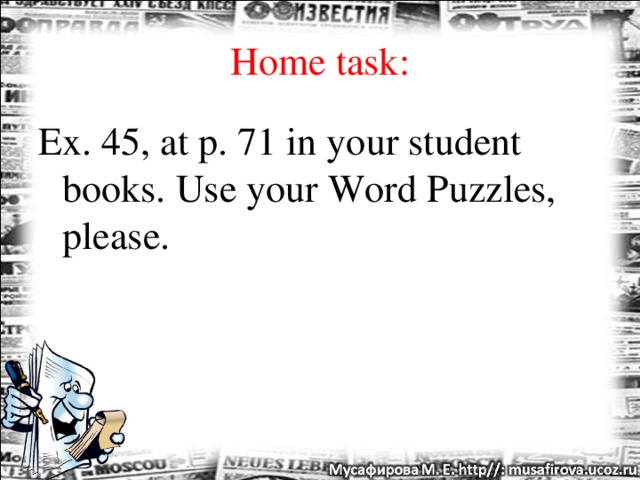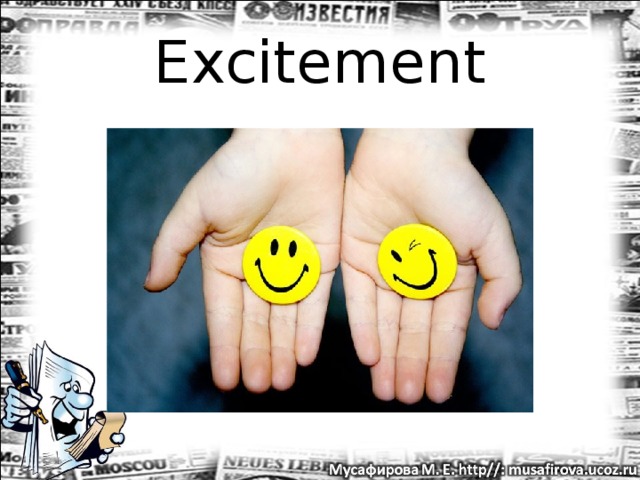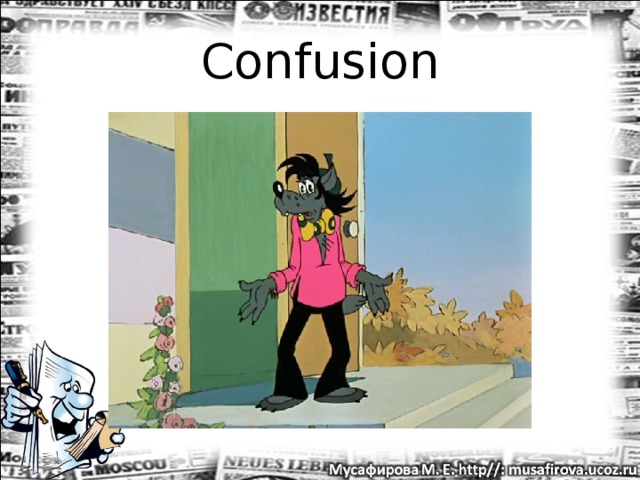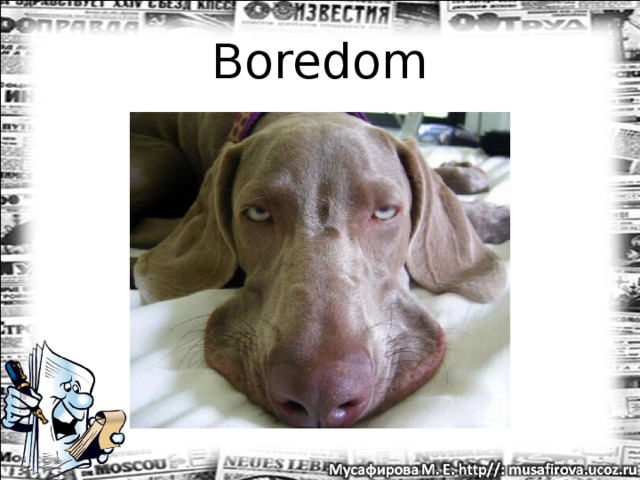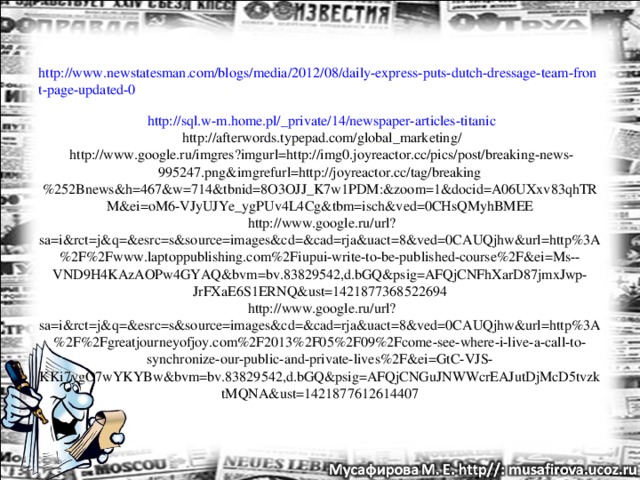(базовый уровень, УМК М.З. Биболетова)
| Этапы учебного занятия | Время | Деятельность учителя | Деятельность обучающегося | Примечание |
| 1. Организационный момент + «разогревка:речевая и фонетическая» (Organization of the lesson + Warm-up) | ~ 2 минуты
~ 1 минута
~ 2 минуты | Teacher: Good morning dear boys and girls! Glad to see you! Take your sits, please. Let`s start our lesson. (учащиеся садятся за столы) Teacher: Today we continue to discuss our topic “Mass media: good or bad”. First of all, answer my questions, please:
Teacher: Now could you tell me what are we going to talk about at today’s lesson? Teacher: That’s right.
Teacher: Now look at the board, please. There are some tongue twisters. They help us to speak English correctly. Can you say them quickly? Who wants to try first?
Ed had edited it.
Say this sharply, say this sweetly;
Say this shortly, say this softly;
Say this sixteen times in succession.
| Pupils: Good morning teacher! Glad to see you too!
(учащиеся отвечают на вопросы) Приблизительные ответы:
P1: Mass media includestelevision, newspapers, tabloids, the Internet, radio.
P2: I prefer the Internet, because I can find a lot of interesting information there.
P3:I reckon that the most popular mass media is television, because many people watch it every day.
P4:No, I don’t. But my grandfather reads newspapers every day.
P5:My father reads newspapers sometimes. P6: Yes, theydo. Oskolskiy Kraj. Zori.
P7:No, I haven’t.
P8: I don’t know any. P9: Maybe, the Times.
P: I think we will speak about English newspapers.
ученики по очереди произносят скороговорки
|
на доске слайд с вопросами (Приложение 1)
на доске слайд с ответами (Приложение 1)
на доске слайд со скороговорками
|
| 2. Формулировка темы и целей урока (Gettingtoknowthetopic)
| ~ 3 минуты
| Teacher: I think, it`s time to know the aim of our lesson. And to do it I offer you to watch a short episode of the presentation? (учитель демонстрирует презентацию с подписанными картинками)
Teacher: You are right. The purposes for today`s lesson are:
| после просмотра презентации, учащиеся пытаются сделать вывод и поставить цели урока Примерные ответы учащихся:
Р 1: I suppose that the aim of the lesson is to speak about newspapers
P 2: I agree with_____ and I hope it would be interesting to know new words.
| на доске слайд с изображениями и словами, которые относятся к теме урока
цели урока высвечиваются слайдом на экран
|
| 3. Тренировкалексики (training of vocabulary) | ~ 5 минут | Teacher:And one more task for you is to write down the words in your Word Puzzles. These words will help us to do the next task. So what is the theme of the lesson? Don’t forget to write the name of the topic. Words: newspaper, tabloid, article, advertisement, daily, news, to be published, detailed, private life, biggest-selling, local | P: The topic is “British Newspapers”.
ученики записывают лексику в индивидуальные карточки | на доске слайд с ключевой лексикой
карточкиWord Puzzle (Приложение 2) |
| 4. 1) Чтение текста. Работа в группе. (reading, work in a group)
Говорение (Speaking) | ~ 4 минуты
~ 5 минут
~ 2 минуты
| Teacher: Now open your Student books, please. Page number 70. There is a text in exercise 34. Look at the task, please. Ok. To do this exercise you will divide into three groups. Imagine that you work for a newspaper. The first group will be the editors and the journalists of the newspaper “Sunday Sunshine”, the second group represents “London News” and the third group’s newspaper is called “The Star” After reading the text the first group will tell us what is the difference between national and local newspapers, the second group will find out the difference between daily and Sunday newspapers and the third group will name the difference between quality/serious newspapers and tabloids. Have 4 minutes.
Teacher:Well done. Could you find in the text the names of the English newspapers and tabloids?
| учащиеся читают задание
учащиеся делятся на 3 группы для чтения и обсуждения текста. Каждая группа читает свою часть задания и готовит ответ на свой вопрос. Примерныеответыучащихся: 1st group: Local newspapers are free. They contain advertisements and local news. National newspapers give information about events happening in the capital. Most of them tell us about politics. 2nd group:Daily newspapers are published every day except Sunday. Sunday newspapers are national and larger than daily ones. 3rd group:Quality papers have many detailed articles about world events. Tabloids are small. They contain many pictures. They describe the lives of famous people. Учащиеся находят в тексте названия: The Sun, the Times, the Daily Telegraph.
| Слайд с названием текста из учебника (Приложение 3)
Слайд с изображениями газет (Приложение 4)
|
| 5. Физкультминутка (Physical break)
| ~ 4 минуты
| Teacher:Are you tired, my dear students? Let’s move a little bit. Your task is to find some statements in this classroom that help us to understand why we need newspapers. We will choose the best. Start searching. Newspapers are world's mirrors. (Газеты-зеркала мира) Journalism is literature in a hurry. (Журналистика-это литература на скорую руку) A newspaper should be the maximum of information, and the minimum of comment. (Газета должна состоять из максимума информации и минимума комментариев) Teacher: Well done and now we can continue the lesson.
| учащиеся выполняют задание: они находят карточки со словами, а затем выбирают то высказывание, котороелучше всего характеризует полезность газет |
На доске слайд с заданием (Приложение 5) |
| 6. Аудирование (listening)
| ~ 5 минут
| Teacher: As you have already said in tabloids and newspapers often is written about famous people, celebrities. But why are they so popular? Why do people read about them in newspapers? Let’s listen to the dialogue and find out. And you have to fill the names of speakers in your cards. | Учащиеся слушают запись и отвечают на вопросы Примерные ответы учащихся:
P 1: Famous people are popular because they are talented and beautiful. P 2:People like to read about their private lives. P3: …
| Звучит запись (Приложение 6)
|
| 7. Завершение работы. Выводы. Оценка работы учащихся. | ~ 3 минуты | Teacher: Well, students let`s do the conclusion of our lesson. Do you remember the purposes of our lesson? Look at them once again. Teacher: Did we get some information about British newspapers? Teacher: Did we discuss the importance of reading? Teacher: Did you learn new words? Teacher: Have we already had a reflection? Dear friends, I am quite satisfied with your work at the lesson today. I am pleased with your answers and work. Thanks for your participation. Yourmarksare: (учитель комментирует оценки, выставленные за работу на уроке)
|
P 1: Yes______
P2: Of course _____
P3: I think we ____
P 4: Not yet.
| на доске снова высвечиваются цели урока
|
| 8. Домашнее задание (Home assignment)
| ~ 2 минута | Teacher: At home you have to do ex. 45, at p. 71 in your student books. Don’t forget to use your Word Puzzles. | ученики записывают домашнее задание в дневники | слайд с домашним заданием |
| 9. Итог урока. Рефлексия
| ~ 2 минуты | Teacher: Thank you for the lesson once again and I want to know how do you feel about today`s lesson? There is one coin for each of you on your desks. Look at the blackboard. There are three newspapers: Boredom, Excitement and Confusion. Which one would you like to buy and read? Stick your pound to one of the newspapers, please. So I will know what you think of our lesson.
Teacher: Now you may be free. See you later. Bye-bye!!! |
Ученикиприкрепляютфунты на газеты: Скука, ВоодушевлениеиСмятение. Учителькомментирует, чтопоравнениюсначалом урока, настроение у некоторых изменилось!!! |
Картинки с газетамиприкреплены к классной доске (Приложение 7,8,9)
|
| итого 40 минут |
